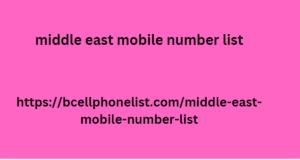This article also appeared on marketing platform Frankwatching
You know how it is: you have a heated debate with someone, you feel your position is weak, you can’t find the right arguments. The other person walks away from you victoriously, and as soon as he is out of sight you think: ‘Shit, I should have said this and that.’
This happened to me recently.
I was talking to a Dutch entrepreneur who wants to expand in Flanders. His budget is tight, so he wants to use his Dutch website to generate Flemish leads. ‘Bad idea, Chris,’ I told him, ‘you should have a .be site made with Flemish texts.’
“Bullshit,” Chris replied, “do you think the But Since our data is collected by human being that is why we 100% accuracy in Our database, We will offer you a type of Full Database middle east mobile number list to cover all the points and enhance your business up till now. We are also updating our database weekly. All our database are fresh & recently updated 2024 My all databases is GDRP base so you can buy here at low price Belgians won’t understand our Dutch?”
At the time I couldn’t really explain why Chris would need a Belgian site. But now I have my eureka moment.
Chris, this one’s for you.
Deus is Latin for God
Language is identity? Flashback to 1998. I was 12 and we had history lessons in our classroom in Papendrecht with master Hendrik-Jan. He told us about the ancient Romans, with their libertine love affairs, their barrels full of wine and their worship of hundreds of gods.
Hendrik-Jan wrote a word on the chalkboard:
god
Before the good man had time to explain that this is Latin for ‘god’, we (the viper brood of 11 and 12 years old) started laughing among ourselves. We thought deus was a particularly funny word. We also didn’t pronounce it as ‘deu-oes’, but simply in Dutch: deus.
Spontaneously we started calling each other deus. We said it jokingly, as if it meant something like ‘idiot’ or ‘idiot’: ‘Hey deus, give me your pen’, and ‘You really are the biggest deus I’ve ever seen’.
Deus became a swear word in our class.
We didn’t care about the real meaning, which Hendrik-Jan would tell us later. We even introduced deus outside our clique: we also taught the word to boys and girls outside our class and school.
Skip ten years. I was 22 by then and had my initiation weekend as a first-year at a college in Breda. With a hundred students I learned in a tent camp on the Dutch-Belgian border by drinking many liters of beer what student life was like.
My initiator was a third-year student named Chaim. In the evening I was sitting with him and a handful of other drunken kids around a campfire. Chaim told me about the incompetence of a particular teacher. ‘Every time I have a lesson with him,’ Chaim said, ‘I think: what a huge deus.’
My brain short-circuited as I was mentally time-machined back to a decade gone by, and to a classroom 45 miles away.
“Chaim…” I began my sentence.
“Yes, Vincent?” my initiator replied, taking a sip of his Jupiler.
‘Are you perhaps from Papendrecht?’
A grin from ear to ear spread across his face. ‘No, not from Papendrecht, but from a neighboring village, from Alblasserdam. Why do you ask? And more importantly: how do you know which region I come from?’
God, that was my answer.
Language = identity
Language is identity, just like dialect and accent. These linguistic elements create recognition, and through that recognition they create trust: ‘Hey, that person speaks like me, so he is like me.’
My student days are now also ten years behind me. My experience with Chaim and the word ‘deus’ makes me realize that that one silly word – strange but true – was part of his and my identity on a microscopic level (and probably of dozens of cameroon telegram material young people from Papendrecht and surroundings).
Communicating in a particular language is therefore not just a matter of ‘surely I understand what I mean’; it is also about creating a bond through written and spoken words, to make the other person feel: look, we belong together.
And that is why I encouraged Chris
The headstrong entrepreneur who wants to conquer Belgium with a website intended for the Dutch market, to start a .be site with Flemish texts.
Chris, I admit it frankly: maybe you are right in aob directory some way. Maybe your Flemish target group will understand what you are trying to sell. But is that enough?
When your potential Flemish customer is directed to a .nl website via an advertisement in Google Ads , won’t he wonder whether your company actually delivers in Belgium?
When that same Flemish person scrolls through your website and comes across words that are not used in Flanders, will he understand what you are talking about? And even if he does understand, won’t it create a distance between you and him?
Also think about the tone of voice . Who says that your Flemish customer wants to be addressed in the same tone as his northern neighbours?
Small things can create distance when it comes to language and identity
The anecdote from my student days made me realize that even the smallest linguistic details can create a bond with someone. This implies that small things can also create distance.
And distance is what you ca n’t use when you’re a newcomer in a particular market.
Be thoroughly prepared when you take your business to another country, that’s all I want to tell you.


